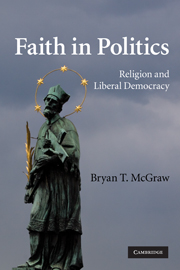Book contents
- Frontmatter
- Contents
- Acknowledgements
- Introduction
- 1 Europe's religious parties and the liberal consensus
- 2 The argument for deliberative restraint
- 3 The problem with secular reasons
- 4 Public reason and religious conflict
- 5 Religion and the problem of political autonomy
- 6 Making the most of conflict: religion and political toleration
- Conclusion: toward a better sort of liberal democracy
- Bibliography
- Index
4 - Public reason and religious conflict
Published online by Cambridge University Press: 05 June 2012
- Frontmatter
- Contents
- Acknowledgements
- Introduction
- 1 Europe's religious parties and the liberal consensus
- 2 The argument for deliberative restraint
- 3 The problem with secular reasons
- 4 Public reason and religious conflict
- 5 Religion and the problem of political autonomy
- 6 Making the most of conflict: religion and political toleration
- Conclusion: toward a better sort of liberal democracy
- Bibliography
- Index
Summary
It is impossible to live in peace with those whom we believe damned.
Jean Jacques Rousseau, The Social ContractIn chapter 3, I explored what I take to be the two most salient and powerful arguments in favor of the idea that citizens have a moral obligation to consult and employ secular as over religious reasons when deliberating about and deciding on political matters. I argued that Robert Audi's epistemological claims in favor of secular reasons failed to distinguish sufficiently between religious and secular reasons and provided only very weak, almost ad hoc, grounds for thinking religiously grounded claims were per se problematic. I then tried to show how Habermas' similar sorts of restrictions relied on untenable sociological claims about secularization that, even in their more nuanced, updated (i.e. “post-secular”) form, failed to do justice to religion's political possibilities even within the context of our “secular age.” Put more broadly, the previous chapter showed the weaknesses of both what we might call the moral-epistemological and the sociological case in favor of secular reasons. Neither does the job its proponents have hoped it would and so the argument in favor of deliberative restraint still needs substantiating.
Of course, Habermas and Audi are not the only scholars to have engaged this question – far from it – and their claims in favor of secular reasons, while redolent of the broader public debate, actually occupy a minority position within academic circles.
- Type
- Chapter
- Information
- Faith in PoliticsReligion and Liberal Democracy, pp. 126 - 175Publisher: Cambridge University PressPrint publication year: 2010
- 1
- Cited by

